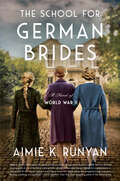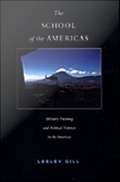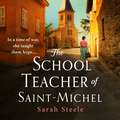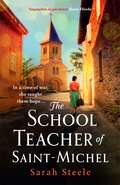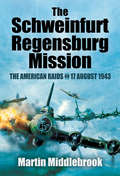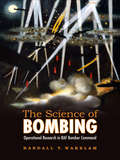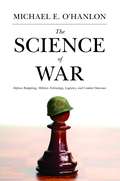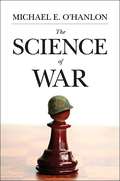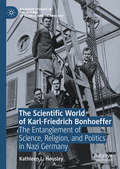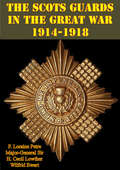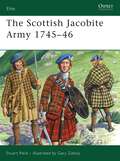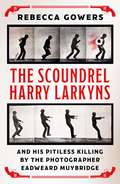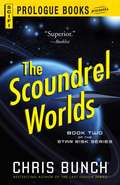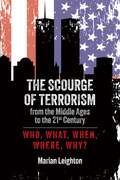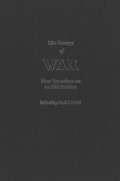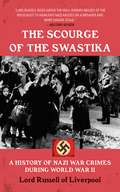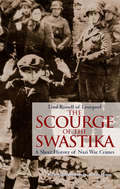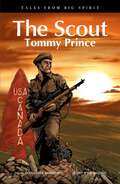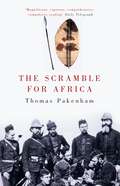- Table View
- List View
The School for German Brides: A Novel of World War II
by Aimie K. RunyanIn this intriguing historical novel, a young woman who is sent to a horrific “bride school” to be molded into the perfect Nazi wife finds her life forever intertwined with a young Jewish woman about to give birth.Germany, 1939As the war begins, Hanna Rombauer, a young German woman, is sent to live with her aunt and uncle after her mother’s death. Thrown into a life of luxury she never expected, Hanna soon finds herself unwillingly matched with an SS officer twenty years her senior. The independence that her mother lovingly fostered in her is considered highly inappropriate as the future wife of an up-and-coming officer and she is sent to a “bride school.” There, in a posh villa on the outskirts of town, Hanna is taught how to be a “proper” German wife. The lessons of hatred, prejudice, and misogyny disturb her and she finds herself desperate to escape. For Mathilde Altman, a German Jewish woman, the war has brought more devastation than she ever thought possible. Torn from her work, her family, and her new husband, she fights to keep her unborn baby safe. But when the unthinkable happens, Tilde realizes she must hide. The risk of discovery grows greater with each passing day, but she has no other options. When Hanna discovers Tilde hiding near the school, she knows she must help her however she can. For Tilde, fear wars with desperation when Hanna proposes a risky plan. Will they both be able to escape with their lives and if they do, what kind of future can they possibly hope for?
The School of the Americas: Military Training and Political Violence in the Americas
by Lesley GillLocated at Fort Benning in Columbus, Georgia, the School of the Americas (soa) is a U. S. Army center that has trained more than sixty thousand soldiers and police, mostly from Latin America, in counterinsurgency and combat-related skills since it was founded in 1946. So widely documented is the participation of the School's graduates in torture, murder, and political repression throughout Latin America that in 2001 the School officially changed its name to the Western Hemisphere Institute for Security Cooperation. Lesley Gill goes behind the faade and presents a comprehensive portrait of the School of the Americas. Talking to a retired Colombian general accused by international human rights organizations of terrible crimes, sitting in on classes, accompanying soa students and their families to an upscale local mall, listening to coca farmers in Colombia and Bolivia, conversing with anti-soa activists in the cramped office of the School of the Americas Watch--Gill exposes the School's institutionalization of state-sponsored violence, the havoc it has wrought in Latin America, and the strategies used by activists seeking to curtail it. Based on her unprecedented level of access to the School of the Americas, Gill describes the School's mission and training methods and reveals how its students, alumni, and officers perceive themselves in relation to the dirty wars that have raged across Latin America. Assessing the School's role in U. S. empire-building, she shows how Latin America's brightest and most ambitious military officers are indoctrinated into a stark good-versus-evil worldview, seduced by consumer society and the "American dream," and enlisted as proxies in Washington's war against drugs and "subversion. "
The Schoolteacher of Saint-Michel: inspired by real acts of resistance, a heartrending story of one woman's courage in WW2
by Sarah SteeleThe Schoolteacher of Saint Michel is a heartrending and deeply moving story of love and hope in World War II from the USA Today bestselling author of The Missing Pieces of Nancy Moon.The war taught her to fight. The children taught her to hope...Inspired by real acts of bravery and resistance, The Schoolteacher of Saint Michel is a heartrending and deeply moving story of one woman's courage and sacrifice during World War II, from the USA Today bestselling author of The Missing Piece of Nancy Moon. This exquisitely beautiful novel is perfect for readers of The Rose Code by Kate Quinn, The Postmistress, Lilac Girls and The Girl from Vichy.'A beautifully worked tale of bravery, woven into the reality of a time we can't forget' Mandy Robotham, author of The Berlin Girl'An emotional, beautifully constructed read. I loved the way the clues from the past and present slowly knitted together, answering the questions that had been missing their answers for so long' Sunday Times bestselling author Jill Mansell'Gripping, at times heartbreaking, but ultimately uplifting, I found this beautifully written novel impossible to put down' Sunday Times bestselling author Katie Fforde'My darling girl, I need you to find someone for me . . .'France, 1942. At the end of the day, the schoolteacher releases her pupils. She checks they have their identity passes, and warns them not to stop until the German guards have let them through the barrier that separates occupied France from Free France. As the little ones fly across the border and into their mothers' arms, she breathes a sigh of relief. No one is safe now. Not even the children.Berkshire, present day. A letter left to her by her beloved late grandmother Gigi takes Hannah Stone on a journey deep into the heart of the Dordogne landscape. As she begins to unravel a forgotten history of wartime bravery and sacrifice, she discovers the heartrending secret that binds her grandmother to a village schoolteacher, the remarkable Lucie Laval . . .'An engaging tale of courage and friendship. A triumph!' Gill Paul'Evocative writing and the storytelling is masterful. It really draws the reader in' Felicity Hayes-McCoy(P)2021 Headline Publishing Group Limited
The Schoolteacher of Saint-Michel: inspired by real acts of resistance, a heartrending story of one woman's courage in WW2
by Sarah SteeleThe war taught her to fight. The children taught her to hope...Inspired by real acts of bravery and resistance, The Schoolteacher of Saint Michel is a heartrending and deeply moving story of one woman's courage and sacrifice during World War II, from the USA Today bestselling author of The Missing Piece of Nancy Moon. This exquisitely beautiful novel is perfect for readers of The Rose Code by Kate Quinn, The Postmistress, Lilac Girls and The Girl from Vichy.'A beautifully worked tale of bravery, woven into the reality of a time we can't forget' Mandy Robotham, author of The Berlin Girl'An emotional, beautifully constructed read. I loved the way the clues from the past and present slowly knitted together, answering the questions that had been missing their answers for so long' Sunday Times bestselling author Jill Mansell'Gripping, at times heartbreaking, but ultimately uplifting, I found this beautifully written novel impossible to put down' Sunday Times bestselling author Katie Fforde'My darling girl, I need you to find someone for me . . .'France, 1942. At the end of the day, the schoolteacher releases her pupils. She checks they have their identity passes, and warns them not to stop until the German guards have let them through the barrier that separates occupied France from Free France. As the little ones fly across the border and into their mothers' arms, she breathes a sigh of relief. No one is safe now. Not even the children.Berkshire, present day. A letter left to her by her beloved late grandmother Gigi takes Hannah Stone on a journey deep into the heart of the Dordogne landscape. As she begins to unravel a forgotten history of wartime bravery and sacrifice, she discovers the heartrending secret that binds her grandmother to a village schoolteacher, the remarkable Lucie Laval . . .'An engaging tale of courage and friendship. A triumph!' Gill Paul'Evocative writing and the storytelling is masterful. It really draws the reader in' Felicity Hayes-McCoy'A gripping journey about the quiet triumphs and breathtaking courage of so many women in wartime' Jane BaileyReaders ADORE The Schoolteacher of Saint Michel:'I loved this book, I finished reading it on VE Day. It is certainly a fitting tribute to the everyday people in France who resisted the German occupation in WW2. 5 stars''Absolutely fabulous. Highly recommend this. I've read The Missing Pieces of Nancy Moon - this is even better''Such a poignant story and beautiful characters. I can highly recommend this book''A lovely book, by turns emotional, exciting and heart-rending. The story is beautifully told. A book that will stay with me. Definitely recommended, particularly to anyone with an interest in World War II historical novels' 'A lovely story of courage and hope at a time of extreme adversity. Wonderfully written, descriptive and poignant. This one is special''Sheer escapism, beautifully written. I highly recommend it'
The Schoolteacher of Saint-Michel: inspired by real acts of resistance, a heartrending story of one woman's courage in WW2
by Sarah SteeleThe war taught her to fight. The children taught her to hope...*The Lost Song of Paris, the new novel from Sarah Steele, is available to pre-order now!*Inspired by real acts of bravery and resistance, The Schoolteacher of Saint Michel is a heartrending and deeply moving story of one woman's courage and sacrifice during World War II, from the USA Today bestselling author of The Missing Piece of Nancy Moon. This exquisitely beautiful novel is perfect for readers of The Rose Code by Kate Quinn, The Postmistress, Lilac Girls and The Girl from Vichy.'A beautifully worked tale of bravery, woven into the reality of a time we can't forget' Mandy Robotham, author of The Berlin Girl'An emotional, beautifully constructed read. I loved the way the clues from the past and present slowly knitted together, answering the questions that had been missing their answers for so long' Sunday Times bestselling author Jill Mansell'Gripping, at times heartbreaking, but ultimately uplifting, I found this beautifully written novel impossible to put down' Sunday Times bestselling author Katie Fforde______'My darling girl, I need you to find someone for me . . .'France, 1942. At the end of the day, the schoolteacher releases her pupils. She checks they have their identity passes, and warns them not to stop until the German guards have let them through the barrier that separates occupied France from Free France. As the little ones fly across the border and into their mothers' arms, she breathes a sigh of relief. No one is safe now. Not even the children.Berkshire, present day. A letter left to her by her beloved late grandmother Gigi takes Hannah Stone on a journey deep into the heart of the Dordogne landscape. As she begins to unravel a forgotten history of wartime bravery and sacrifice, she discovers the heartrending secret that binds her grandmother to a village schoolteacher, the remarkable Lucie Laval . . .______'An engaging tale of courage and friendship. A triumph!' Gill Paul'Evocative writing and the storytelling is masterful. It really draws the reader in' Felicity Hayes-McCoy'A gripping journey about the quiet triumphs and breathtaking courage of so many women in wartime' Jane BaileyReaders ADORE The Schoolteacher of Saint Michel:'I loved this book, I finished reading it on VE Day. It is certainly a fitting tribute to the everyday people in France who resisted the German occupation in WW2. 5 stars''Absolutely fabulous. Highly recommend this. I've read The Missing Pieces of Nancy Moon - this is even better''Such a poignant story and beautiful characters. I can highly recommend this book''A lovely book, by turns emotional, exciting and heart-rending. The story is beautifully told. A book that will stay with me. Definitely recommended, particularly to anyone with an interest in World War II historical novels' 'A lovely story of courage and hope at a time of extreme adversity. Wonderfully written, descriptive and poignant. This one is special''Sheer escapism, beautifully written. I highly recommend it'
The Schweinfurt-Regensburg Mission: The American Raids on 17 August 1943 (Cassell Military Paperbacks Ser.)
by Martin MiddlebrookA detailed history of the American World War II bombing mission over Nazi Germany, by the author of The First Day on the Somme. On August 17, 1943, the entire strength of the American heavy bomber forces in England set out to raid two major industrial complexes deep in southern Germany: the Messerschmitt aircraft factory and the KGF ball bearing plant. For American commanders, it was the culmination of years of planning, the day when their self-defending formations of the famous Flying Fortress could at last perform their true role, reaching out by daylight to strike at targets in the deepest corners of industrial Germany. The day ended in disaster for the Americans. Thanks to the courage of the aircrews, the bombers won through to the targets and caused heavy damage, but sixty were shot down and the hopes of the American commanders were shattered. Historically, it was one of the most important days for the American air forces during the Second World War. While researching this catastrophic raid, author Martin Middlebrook interviewed hundreds of the airmen involved, German defenders, &“slave workers,&” and eyewitnesses. The result is a mass of fresh, previously unused material with which the author finally provides the full story of this famous day&’s operations. Not only is the American side elaborated upon, but the previously vague German side of the story—both the Luftwaffe action and the civilian experiences in Schweinfurt and Regensburg—is also now presented clearly and in detail for the first time. Middlebrook also covers the important question of why the RAF did not support the American effort and follow up the raid on Schweinfurt as planned.
The Science of Bombing: Operational Research in RAF Bomber Command
by Randall Thomas WakelamAfter suffering devastating losses in the early stages of the Second World War, the United Kingdom's Royal Air Force established an Operational Research Section within bomber command in order to drastically improve the efficiency of bombing missions targeting Germany. In The Science of Bombing,Randall Wakelam explores the work of civilian scientists who found critical solutions to the navigational and target-finding problems and crippling losses that initially afflicted the RAF.Drawing on previously unexamined files that re-assess the efficacy of strategic bombing from tactical and technical perspectives, Wakelam reveals the important role scientific research and advice played in operational planning and how there existed a remarkable intellectual flexibility at Bomber Command. A fascinating glimpse into military strategy and decision-making, The Science of Bombing will find a wide audience among those interested in air power history as well as military strategists, air force personnel, and aviation historians.
The Science of War: Defense Budgeting, Military Technology, Logistics, and Combat Outcomes
by Michael E. O'HanlonAn essential introduction to modern defense policyThe U.S. military is one of the largest and most complex organizations in the world. How it spends its money, chooses tactics, and allocates its resources have enormous implications for national defense and the economy. The Science of War is the only comprehensive textbook on how to analyze and understand these and other essential problems in modern defense policy.Michael O'Hanlon provides undergraduate and graduate students with an accessible yet rigorous introduction to the subject. Drawing on a broad range of sources and his own considerable expertise as a defense analyst and teacher, he describes the analytic techniques the military uses in every crucial area of military science. O'Hanlon explains how the military budget works, how the military assesses and deploys new technology, develops strategy and fights wars, handles the logistics of stationing and moving troops and equipment around the world, and models and evaluates battlefield outcomes. His modeling techniques have been tested in Iraq and Afghanistan, including the methods he used to predict higher-than-anticipated troop fatalities in Iraq—controversial predictions that have since been vindicated.The Science of War is the definitive resource on warfare in the twenty-first century.Gives the best introduction to defense analysis availableCovers defense budgetingShows how to model and predict outcomes in warExplains military logistics, including overseas basingExamines key issues in military technology, including missile defense, space warfare, and nuclear-weapons testingBased on the author's graduate-level courses at Princeton, Columbia, and Georgetown universities
The Science of War: Defense Budgeting, Military Technology, Logistics, and Combat Outcomes
by Michael E. O’hanlonThe U.S. military is one of the largest and most complex organizations in the world. How it spends its money, chooses tactics, and allocates its resources have enormous implications for national defense and the economy. The Science of War is the only comprehensive textbook on how to analyze and understand these and other essential problems in modern defense policy. Michael O'Hanlon provides undergraduate and graduate students with an accessible yet rigorous introduction to the subject. Drawing on a broad range of sources and his own considerable expertise as a defense analyst and teacher, he describes the analytic techniques the military uses in every crucial area of military science. O'Hanlon explains how the military budget works, how the military assesses and deploys new technology, develops strategy and fights wars, handles the logistics of stationing and moving troops and equipment around the world, and models and evaluates battlefield outcomes. His modeling techniques have been tested in Iraq and Afghanistan, including the methods he used to predict higher-than-anticipated troop fatalities in Iraq--controversial predictions that have since been vindicated. The Science of War is the definitive resource on warfare in the twenty-first century. * Gives the best introduction to defense analysis available * Covers defense budgeting * Shows how to model and predict outcomes in war * Explains military logistics, including overseas basing * Examines key issues in military technology, including missile defense, space warfare, and nuclear-weapons testing * Based on the author's graduate-level courses at Princeton, Columbia, and Georgetown universities
The Sciences Po Series in International Relations and Political Economy
by Samy CohenNumerous democratic nations have been singled out by NGOs for brutality in their modus operandi, for paying inadequate attention to civilian protection or for torture of prisoners. This book deals with the difficulties faced when conducting asymmetric warfare in populated areas without violating humanitarian law.
The Scientific World of Karl-Friedrich Bonhoeffer: The Entanglement Of Science, Religion, And Politics In Nazi Germany (Palgrave Studies in the History of Science and Technology)
by Kathleen L. HousleyIn twentieth-century Germany, Karl-Friedrich Bonhoeffer rose to prominence as a brilliant physical chemist, even as several of his relatives—Dietrich Bonhoeffer among them—became involved in the resistance to Hitler, leading to their executions. This book traces the entanglement of science, religion, and politics in the Third Reich and in the lives of Karl-Friedrich, his family and his colleagues, including Fritz Haber and Werner Heisenberg. Nominated for the Nobel Prize, Karl-Friedrich was an expert on heavy water, a component of the atomic bomb. During the war, he was caught in the middle between relatives who were trying to kill Hitler and friends who were helping Hitler build a nuclear weapon. Karl-Friedrich emerges as a complex figure—an agnostic whose brother was a renowned theologian, and a chemist who both reluctantly advised German nuclear scientists and collaborated with Paul Rosbaud, a spy for the British. Illuminating the uneasy position of science in twentieth-century Germany, The Scientific World of Karl-Friedrich Bonhoeffer is the story of a man in love with chemistry, his family, and his nation, trying to do right by all of them in the midst of chaos.
The Scots Guards in the Great War 1914-1918 [Illustrated Edition]
by F. Loraine Petre Major-General Sir H. Cecil LowtherIncludes 15 maps and plans."In 1914 the Scots Guards (Third Regiment of Foot Guards) consisted of two battalions, both in England and two week after the outbreak of war the 3rd (Reserve) Battalion was formed; this battalion did not go abroad but during the course of the war it provided drafts of 11,201 all ranks for the 1st and 2nd Battalions. The 1st Battalion went to France with the 1st (Gds) Brigade, 1st Division on 14 August and served on the Western Front throughout the war; the 2nd Battalion joined the 20th Brigade of the 7th Division when it formed in September 1914, and landed in Belgium on 7 October 1914 and also served on the Western front for the whole of the war. Losses numbered 111 Officers and 2730 Other Ranks; 30 battle honours and 5 VCs were awarded. In August 1915 the Guards Division was formed in France and both battalions were transferred to it, the 1st to the 2nd Guards Brigade, the 2nd to 3rd Guards Brigade....This book is set out in chronological order, and though the battalions were not in the same division during the first twelve months of the war their actions are not recorded under separate headings. Thus both battalions were in action during First Ypres and they both appear in the chapter covering that battle. Apart from war diaries, there are extracts from letters and other contributions from those who were there making up the narrative and the result is a plain, straightforward account. From time to time the list of officers present in both battalions is given as are the names of those who became casualties during any specific action."-Print ed.
The Scottish Jacobite Army 1745-46
by Stuart Reid Gary ZabolyOsprey's examination of the Scottish Jacobite army during the Jacobite Rising of 1745. The heart of this book is the story of Bonnie Prince Charlie's army at Culloden. It strips away the myth and exposes the realities of life in the Jacobite rebel army. It begins with the raising of the army which included volunteers, 'pressed men' and mercenaries, as well as French forces that were sent over to assist as part of the 'Auld Alliance'. Unit organization, weapons, and tactics are discussed and the book also details the vicious battles that were fought in this doomed attempt to secure the British crown. After the Jacobite rebellion was finally crushed at Culloden, many of the survivors were surprisingly drafted into the British Army alongside their former enemies and saw service in North America during the French-Indian War (1754-1763). The wonderful color plates and rare images illustrate the variety of uniforms that were worn ranging from tartan to regular army dress. This is an essential introductory guide to the Jacobite armies as well as a definitive reference to the uniforms and weaponry of the period.
The Scoundrel Harry Larkyns and his Pitiless Killing by the Photographer Eadweard Muybridge
by Rebecca GowersSHORTLISTED FOR THE HWA NON-FICTION CROWNDiamond thief, guerrilla fighter, spy, decorated hero, bohemian rogue and lover of several notorious women - all describe Major Harry Larkyns. Yet he has long been dismissed as merely a liar and a cheat, famous only for being shot dead in 1874 by the unnerving photographer Eadweard Muybridge. But has history properly understood either the killer or his victim? Part biography, part crime investigation, THE SCOUNDREL HARRY LARKYNS uncovers some extraordinary truths, and is historical detective work at its finest.'One of the best books of the year' Irish Times'Strange, brilliant, quirky and illuminating' Country Life'A story that is as eventful as it is tragic' Guardian'A masterpiece of historical detective work' Keith Lowe
The Scoundrel Worlds
by Chris BunchSkyball is popular, challenging, and violent. In other words, the greatest sport in the universe. The mercenary team of Star Risk, Ltd. has been hired to watch it. . . closely. Two opposing worlds are neck and neck, and lately the game's been a real killer. Riots, murder, a real madhouse for loyal fans. It's up to Star Risk to keep it galaxy-friendly. Good luck to them. They don't stand a sporting chance.
The Scoundrel Worlds
by Chris BunchSkyball - popular, challenging, violent . . . and the greatest sport in the universe. Two opposing worlds are neck and neck in the championships, and lately the game's been a killer. It's up to the mercenaries of Star Risk, Ltd., to keep the two sides galaxy-friendly.The Star Risk team put their lives on the line again . . . for the money, of course. If they don't get killed themselves.
The Scoundrel Worlds: Book Two of the Star Risk Series
by Chris BunchSkyball - popular, challenging, violent . . . and the greatest sport in the universe. Two opposing worlds are neck and neck in the championships, and lately the game’s been a killer. It’s up to the mercenaries of Star Risk, Ltd., to keep the two sides galaxy-friendly.The Star Risk team put their lives on the line again . . . for the money, of course. If they don’t get killed themselves.
The Scourge of Terrorism from the Middle Ages to the Twenty-First Century: Who, What, When, Where, Why?
by Marian P. LeightonThis is the first book covering the entire timeline as well as the actors and factors driving international terrorism in each phase of its development. It provides an historical journey across the terrorist landscape and offers insights and analyses of th
The Scourge of War
by Paul F. DiehlJ. David Singer's legendary Correlates of War project represented the first comprehensive effort by political scientists to gather and analyze empirical data about the causes of war. In doing so, Singer and his colleagues transformed the face of twentieth-century political science. Their work provoked some of the most important debates in modern international relations -- about the rules governing territory, international intervention, and the so-called "democratic peace." Editor Paul F. Diehl has now convened some of the world's foremost international conflict analysis specialists to reassess COW's contribution to our understanding of global conflict. Each chapter takes one of COW's pathbreaking ideas and reevaluates it in light of subsequent world events and developments in the field. The result is a critical retrospective that will reintroduce Singer's important and still-provocative findings to a new generation of students and specialists.
The Scourge of the Swastika: A History of Nazi War Crimes During World War II
by Russell Of LiverpoolWhen discussing the German war crimes of the Second World War, modern histories have focused on the Holocaust. While the Final Solution was a unique and unparalleled horror, German atrocities did not end there. The Nazis terrorized their own citizens, tortured and murdered POWs, and carried out countless executions throughout occupied Europe. Lord Russell of Liverpool was part of the legal team that brought Nazi war criminals to justice, and from this first-hand position, he published the sensational, bestselling The Scourge of the Swastika in 1954. Liverpool shows that the actions of the Third Reich, including the Holocaust, were illegal, not merely immoral.
The Scourge of the Swastika: A Short History of Nazi War Crimes
by Lord Russell of Liverpool&“Lord Russell rises above the well-known abuses of the Holocaust to highlight Nazi abuses on a broader and more savage scale.&” —Military Review This factual account of German war crimes of World War II is a formidable indictment of Nazi brutality and of the monstrous organization which so terrorized occupied Europe and murdered at least 12 million civilians. Along with The Knights of Bushido: A Short History of Japanese War Crimes, by the same author, it was a phenomenal bestseller when first published. Drawing on documentary evidence submitted to the Nuremberg Trials and brilliantly written by an expert intimately connected to the prosecution of war criminals, this searing condemnation of the Third Reich&’s crimes is factual, objective and unstinting in its efforts to expose the truth behind real or alleged atrocities. It examines Hitler&’s instruments of tyranny and repression the SS, Gestapo and Army; German crimes against prisoners of war; outrages committed on the high seas; crimes against civilian populations; the mass use of slave labor; the concentration camps; and the &“Final Solution.&”&“An authoritative and evidential source of the horrors of the Holocaust . . . A benchmark classic that deals effectively with Hannah Arendt&’s &‘banality of evil.&’&”—The Times Higher Education&“This is not an easy read—the subject material means that it never could be, but it is a very valuable, legally informed account of some of the most appalling atrocities ever committed, and a valuable reminder of why the Second World War had to be fought.&” —History of War
The Scout: Tommy Prince (Tales from Big Spirit #6)
by David A. RobertsonA search down a wooded path for a well-hit baseball turns into an encounter between Pamela and a veteran soldier standing in front of a monument. The statue commemorates the heroism of Sgt. Tommy Prince, the most decorated Aboriginal soldier in Canada. Pamela is curious, and the veteran is happy to regale her with the story of the expert marksman and tracker, renowned for his daring and bravery in World War II and the Korean War.The Scout is one book in the Tales from Big Spirit series. Tales from Big Spirit is a unique seven-book graphic novel series that delves into the stories of seven great Indigenous heroes from Canadian history—some already well known and others who deserve to be. Designed to correspond to grades 4–6 social studies curriculums across Canada, these full colour graphic novels could be used in literature circles, novel studies, and book clubs to facilitate discussion of social studies topics. These books will help students make historical connections while promoting important literacy skills.
The Scout: Tommy Prince (Tales from Big Spirit #6)
by David A. RobertsonA search down a wooded path for a well-hit baseball turns into an encounter between Pamela and a veteran soldier standing in front of a monument. The statue commemorates the heroism of Sgt. Tommy Prince, the most decorated Aboriginal soldier in Canada. Pamela is curious, and the veteran is happy to regale her with the story of the expert marksman and tracker, renowned for his daring and bravery in World War II and the Korean War.The Scout is one book in the Tales from Big Spirit series. Tales from Big Spirit is a unique seven-book graphic novel series that delves into the stories of seven great Indigenous heroes from Canadian history—some already well known and others who deserve to be. Designed to correspond to grades 4–6 social studies curriculums across Canada, these full colour graphic novels could be used in literature circles, novel studies, and book clubs to facilitate discussion of social studies topics. These books will help students make historical connections while promoting important literacy skills.
The Scout: Tommy Prince (Tales from Big Spirit)
by David A. RobertsonA search down a wooded path for a well-hit baseball turns into an encounter between Pamela and a veteran soldier standing in front of a monument. The statue commemorates the heroism of Sgt. Tommy Prince, the most decorated Aboriginal soldier in Canada. Pamela is curious, and the veteran is happy to regale her with the story of the expert marksman and tracker, renowned for his daring and bravery in World War II and the Korean War.The Scout is one book in the Tales from Big Spirit series. Tales from Big Spirit is a unique seven-book graphic novel series that delves into the stories of seven great Indigenous heroes from Canadian history—some already well known and others who deserve to be. Designed to correspond to grades 4–6 social studies curriculums across Canada, these full colour graphic novels could be used in literature circles, novel studies, and book clubs to facilitate discussion of social studies topics. These books will help students make historical connections while promoting important literacy skills.
The Scramble for Africa
by Thomas PakenhamThe Scramble for Africa astonished everyone.In 1880 most of the continent was ruled by Africans, and barely explored. By 1902, five European Powers (and one extraordinary individual) had grabbed almost the whole continent, giving themselves 30 new colonies and protectorates and 10 million square miles of new territory, and 110 million bewildered new subjects. Thomas Pakenham's story of the conquest of Africa is recognised as one of the finest narrative histories of the last few decades.
